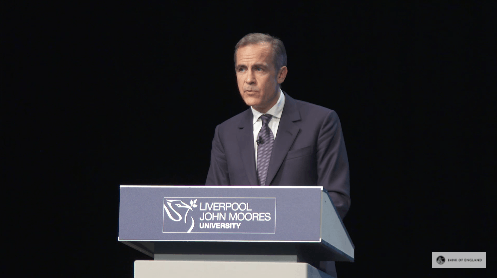In a speech The Specture Of Monetarism, at Liverpool John Moores University, the Governor of the Bank of England, Mark Carney talked about globalization and inequality.
The central theme of Carney’s speech and also the new/recent consensus of the economics profession is this:
III. The Way Forward
Given these developments, the challenge is how to manage and moderate the forces of innovation and integration which breed aggregate prosperity for the economy as a whole but which also foster isolation and detachment for substantial proportions of the population. In the balance of my remarks, I will focus on three priorities for doing so.
First, economists must clearly acknowledge the challenges we face, including the realities of uneven gains from trade and technology.
Second, we must grow our economy by rebalancing the mix of monetary policy, fiscal policy and structural reforms.
Third, we need to move towards more inclusive growth where everyone has a stake in globalisation.
[bold in original]
click the picture for the video and the text
While this acknowledges the trouble with globalization—under the current rules—it is still flawed. Carney continues to say:
Consider the disconnect between economists and workers. The former have not been sufficiently upfront about the distributional consequences of rapid changes in technology and globalisation. Amongst economists, a belief in free trade is totemic.xiv But, while trade makes countries better off, it does not raise all boats; in the clinical words of the economist, trade is not Pareto optimal.xv
…
(endnotes)
…
xiv E.g. Bhagwati, J. (2011), “Why free trade matters”, Project Syndicate, June 23.
xv In neoclassical models, free trade is Pareto Optimal in principle – in that the aggregate gains are sufficient to compensate those that lose out while preserving gains for the winners. This typically means some form of redistribution of the gains from trade is needed to achieve this outcome. This is the Kaldor-Hicks compensation principle. It is an open question, however, whether redistribution of this kind actually takes place in practice and, indeed, whether it is itself costless, as the Kaldor-Hicks principle assumes.
So Carney’s point is more about “Pareto optimality”, than on globalization under the current system.
The trouble with this view—as can be inferred from the quotes above—is that it’s based on the assumption of convergence of nations’ fortunes via globalization and free trade under the current system, instead of divergence and polarization. In other words, not only does globalization and free trade contribute to grievances for some economic actors, but also to nations and hence the world as a whole. Under a different set of rules, each nation would be better off and might avoid polarization.
As Nicholas Kaldor himself said (quoted above!) in 1980 in Foundations And Implications Of Free Trade Theory, written in 📚 Unemployment In Western Countries:
Owing to increasing returns in processing activities (in manufactures) success breeds further success and failure begets more failure. Another Swedish economist, Gunnar Myrdal called this’the principle of circular and cumulative causation’.
It is as a result of this that free trade in the field of manfactured goods led to the concentration of manufacturing production in certain areas – to a ‘polarization process’ which inhibits the growth of such activities in some areas and concentrates them on others.
You can preview Kaldor’s article on Google Books. It’s his finest.
